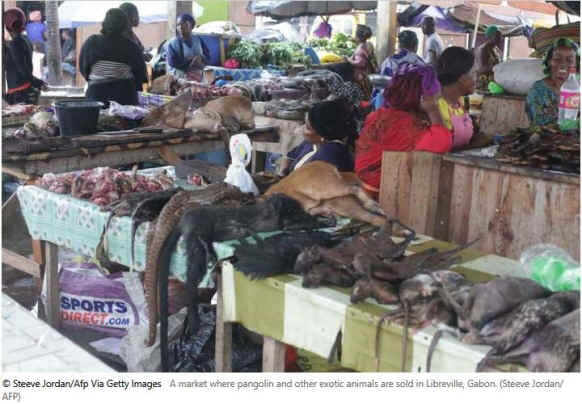A few video reports centre
attention on what many scientists considered to be the likely cause of the pandemic - the appalling and longstanding practice
(in South Asian countries and China in particular) of having vast open air 'wet meat
markets' where a variety of often smuggled and exotic wildlife is either sold or
slaughtered 'on the spot' for sale to buyers who believe that (for example) stewed tiger
pups can endow them with enhanced sexual potency. This is a baby African Serval Cat. Its
mother was probably shot. Many
websites exist to trade in exotic species. The USA is a major market for 'exotic' pets
- one example
centred upon lions and tigers is well known.
The term 'wet markets' derives in part from the melting ice used to cool items on sale but
also often from all the blood and excreta from so many species running off the chopping
boards and into the gutters. These areas have been described as a petri dish for pathogens
- and ideal for spreading bacteria and viruses from one species to another. Much of the illicit wildlife trade in the
world is centred not only on these markets (some of which span several square miles in
area apparently) but on the criminal gangs who supply not only these markets but the
world-wide 'pet' trade in endangered species, often servicing wealthy clients in
'developed' countries. Two references out of the dozens available. The pangolin is the
world's most trafficked mammal - for its scales.
General discussion of wet meat
markets, and the end of life for
one small grouper, far removed from the fish counter at your local Waitrose! Groupers
are a major food fish. Some types can grow to over 350kg. Eating fish is probably a
safe way of obtaining protein - certainly safer than 'bush meat'.
Some
experts have argued against closing all outdoor 'wet' markets because they are so
aligned with Chinese customs of wanting 'warm meat' - freshly killed as opposed to being
slaughtered under more closely controlled conditions. The
huge Chinese market in dog and cat meat is also under scrutiny and even within China.
Most Chinese do not eat cat or dog: their only link to the markets is having their pets
stolen by criminal gangs who supply the industry with many or most of their animals.
In early April 2020 The Washington Post published one of the first 'mainstream' articles
highlighting the importance of the animal trade in possibly having caused Covid-19 - and at this time world-wide deaths were
only 65,000. A more lethal new type of virus might easily have killed 650,000 within a
couple of months - a point that needs to be much more widely appreciated because the
coronavirus mortality rate is probably much less than 1%.
Wild animals have always had viruses. But a global wildlife trade worth billions of dollars, agricultural intensification, deforestation and urbanisation are bringing people closer to animals, giving their viruses more chances to infect us. Most fail or succeed on small scales. Very few, like SARS-CoV-2, the novel coronavirus, triumph, aided by a supremely interconnected human population that can transport a pathogen around the world.
Many disease researchers say the coronavirus pandemic must be taken as a deadly warning. That means thinking of animals as partners whose health and habitats should be protected to stave off the next global outbreak.
“Pandemics as a whole are increasing in frequency,” said Peter Daszak, a disease ecologist who is president of EcoHealth Alliance, a public health organisation that studies emerging diseases. “It’s caused by what we do to the environment.....”
Late last year, a horseshoe bat coronavirus is thought to have leaped in China, scientists say, where commerce in exotic animals is driven by luxury tastes in game and demand for parts used for medicinal purposes.
At a “wet market” in Wuhan linked to an early cluster of coronavirus cases, at least one store sold creatures including wolf cubs and masked palm civets for consumption. Such markets, experts say, feature stressed and ill animals stacked in cages, bodily fluids sprinkling down, as well as butchering — prime conditions for viral spillover.
The Wildlife Conservation Society and other groups have called on countries to prohibit the trade in wild animals for food and close wet markets. Anthony S. Fauci, the USA's top infectious-diseases expert said that the world community should pressure China and other nations that host such markets to shut them down.
“It just boggles my mind how, when we have so many diseases that emanate out of that unusual human-animal interface, that we don’t just shut it down.”
**********************************************************************
An interesting TEDx talk by global health expert Alanna Shaikh covered the 2019/2020 coronavirus outbreak and what this could teach the world about epidemics yet to come.
Undercover journalists visited a wet meat market in Thailand ("a torture chamber and a filthy laboratory all mixed into one") (the first two pictures are from their youtube video)
Chinese dog meat market. (link includes videos from India also)

Wildlife market in Libreville, Gabon
An excellent BBC article on
the wildlife trade
by journalist Helen Briggs, April 2020."
The Chinese will eat anything that
moves, except tables and chairs."
This
report includes a photo of pigs about to be buried alive after outbreak of African
Swine Fever in China - inhumane maybe but the USA reportedly buried thousands of Iraqi
troops during the Gulf War.
The
wet market in Wuhan was reopened in mid April 2020.
Some
videos of dogs for sale as meat in videos linked to this article.